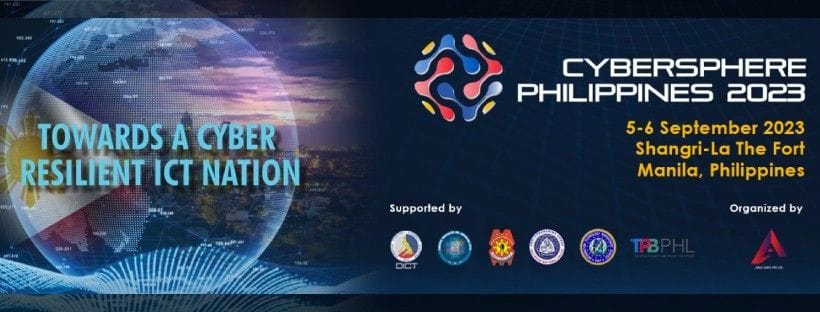by Simoné V. Jalbuena
As we continue to digitize our cities and industries, experts have long pointed out the many risks that come with so much of our daily lives coming online, emphasizing the importance of cybersecurity education.
This week, leaders across the information and communication technology (ICT), international cybersecurity, and cloud solutions sectors gathered for Cybersphere Philippines 2023. This two-day conference emphasized the need for collaborative efforts across sectors to enhance our nation’s cyber resiliency. The event served as a platform for leaders, practitioners, regulators, policymakers, and vendors to exchange experiences and explore opportunities in harnessing the potential of technology, while safeguarding against its threats and risks.

By working together, government agencies, private sector players, educational institutions, and individual consumers can maximize the potential of technology while safeguarding against its pitfalls. Here are fifteen takeaways from the two day conference.
For Companies and Organizations
- Localize Artificial Intelligence (AI). Nurturing AI with local nuances should be a priority. Companies and organizations are encouraged to use AI in addressing the specific needs of their users, enhancing its relevance and practicality. These may lead to higher adoption (due to applications being more relevant) and lessen the biases that hinder use cases of AI locally.
- Lay Down Firm Cybersecurity Foundations. Companies and organizations should ensure the fundamentals, or according to Dominic Ligot “the basics”, are intact by strengthening passwords, enhancing cyber hygiene, and fortifying their networks and internet infrastructure. This applies to both a company’s infrastructure and culture around cybersecurity.
- Simplify Language. Complex jargon in technology can confuse and alienate your communities. Simplifying terms and streamlining communication may narrow the knowledge gap and foster inclusivity.
- Create Awareness Campaigns. Keep your communities informed on the importance of data protection and responsible technology usage through anti-scam projects, talks, and webinars.
- Establish Skill Development Initiatives. Training programs to enhance technology skills among Filipinos can empower your current and future workforces to champion innovation and security within your organization.
- Promote Collaboration. Encouraging collaboration among companies fosters innovation and knowledge sharing, collectively safeguarding against data breaches, hacks, and other digital risks.
- Advance Environmental Responsibility Endeavors. Reducing carbon footprints should be a priority for businesses. New technologies today allow for easier and more transparent adoption of climate-neutral practices (such as carbon offsetting). By minimizing their environmental impact, organizations also encourage their consumers to follow suit.
For the Government
- Enhance Digital Infrastructure. Building robust digital infrastructure is fundamental to the country’s technological progress and protection against cybersecurity threats. As more communities come online, governments should ensure that the benefits of this connectivity are not outweighed by the risks of leaving these systems insecure and vulnerable.
- Engage with Foreign Stakeholders. Where possible and within reason, engaging in international cooperation can promote digital diplomacy, providing opportunities for technological advancements and collaborative ventures to propel the nation forward.
- Push for Gender Inclusivity. Striving for the active participation of historically underrepresented groups, such as women and the LGBTQIA+ community, is crucial to fostering diversity, empowerment, and equal opportunity in the digital world we are building.
- Increase Digital Literacy. Initiatives, such as education and awareness programs, should equip individuals with essential digital skills and knowledge to navigate the digital realm confidently.
For the School Systems
- Collaborate Between Public and Private Institutions. Educational institutions should consider partnering with government units and private companies to develop training programs. These programs should align with industry needs and equip students with hard and soft skills that meet the realities these students will enter into once leaving school.
- Adapt Curriculums. To meet the demands of the tech industry, schools can adapt their curricula to include more experiential learning. Following the 70-20-10 model, as mentioned by Carlo Malana—70% on experiences, 20% on learning from others, and 10% on the ability to continuously learn—ensures that students will become knowledgeable and resilient in the digital landscape.
For the General Public
- Utilize Privacy Controls. Consumers are reminded of the importance of utilizing privacy controls embedded in social media platforms. Being mindful of what information is shared and who can access it is necessary for protecting personal data.
- Understand Terms and Conditions. Consumers should be conscious of the rules and guidelines they agree to when using online services. Reading and comprehending these agreements informs them of how their data is utilized and prevents unexpected privacy breaches.
Cybersphere Philippines 2023 was organized by APAC Expo, presented by GCash, with participation from the Department of Information and Communications Technology (DICT), Cybercrime Investigation and Coordinating Center (CICC), Philippine National Police (PNP), Anti-Cybercrime Group (PNP – ACG), Information Technology Management Service (PNP – ITMS), Tourism Promotions Board Philippines (TPBPHL), and the National Bureau of Investigation in the Philippines.


